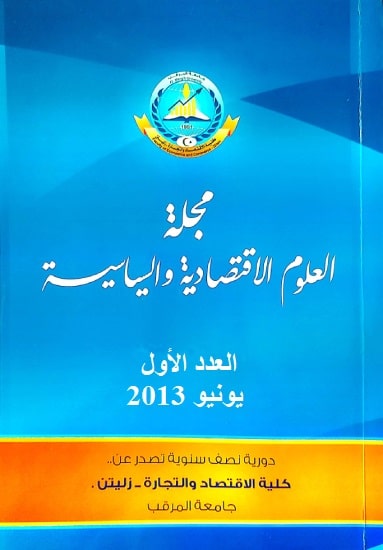إثر شدة الموقف الأخلاقي في عملية صنع القرار الأخلاقي دراسة ميدانية لطلبة المحاسبة في بعض الدول العربية ودول غرب أوروبا
الملخص
تهدف هذه الدراسة إلى دراسة دور بعض أبعاد شـدة الموقـف الأخلاقي وأثرها في عملية صنع القرار الأخلاقي لطلبة المحاسبة في بعـض البلدان العربية (ليبيا والمملكة الـسعودية) والأوروبيـة (أسـبانيا والمملكـة المتحدة)، وكذلك إجراء بعض المقارنات العملية بين تلك البلـدان. ولتحقيـق هدف الدراسة فقد وزعت استمارة الاستبيان المتضمنة مجموعة من الحـالات المحاسبية التي يمكن أن تواجه المحاسب عند تأديته لعمله بمنظمات ا لأعمـال على طلبة المحاسبة بعدد من الجامعات في تلك البلدان، وباسـتخدام بعـض الاختبارات الإحصائية المتقدمة مثل اختبار t وتحليل الانحدار المتعـدد تـم تحليل البيانات المجمعة واختبار فرضيات الدراسة.وقد أظهرت نتائج الدراسة وجود العديد من العلاقات الإيجابية ذات الدلالة المعنوية بـين أبعـاد شـدة الموقـف الأخلاقـي dimensions moral intensity)) ومراحل صنع القرار الأخلاقي (ethical decision making stages) قيد الدراسة. كما بينت الدراسة أن هناك علاقـة قويـة ذات دلالـة معنوية بين مراحل صنع القرار الأخلاقي نفسها المقترحة مـن قبـل Rest 1986. كما أوضحت نتائج الدراسة أن هناك فروقاً ذات دلالة معنويـة بـين مراحل صنع القرار الأخلاقي لطلبة المحاسبة العرب والأوربيين. من أبرز توصيات الدراسة ضرورة تـضمين بعـض المحـاور الدراسية الخاصة بالجوانب السلوكية الأخلاقية للعاملين بمنظمات الأعمال من خلال استعراض بعض الحالات المحاسبية العملية علـى طلبـة المحاسـبة، وضرورة إجراء المزيد من الدراسات والبحوث السلوكية الأخلاقية للعـاملين بالمنظمات الدولية والمنظمات الحكومية المختلفة وإجراء المقارنات الـسلوكية اللازمة بين بيئات الأعمال المختلفة حول العالم، لكي تساعد في فهم الـ سلوك الأخلاقي للعاملين في الشركات والمنظمات الدولية التي تعمـل فـي بيئـات تختلف ثقافتها عن موطنها الأصلي.
المراجع
- السعد، ص. ب ع. ا. (2011). العوامل المؤثرة على السلوك الأخلاقي في بيئة المراجعة السعودية: دراسة ميدانية (استكشافية). مجلة كلية التجارة للبحوث العلمية: جامعة الإسكندرية، العدد الأول (المجلد الثامن والأربعون)، ص 187 –ص 232.
- Barnett, T. (2001). Dimensions of moral intensity and ethical decision making: An empirical study. Journal of Applied Social Psychology, 31(5), 1038-1057.
- Barnett, T., & Valentine, S. (2004). Issue contingencies and marketers' recognition of ethical issues, ethical judgments and behavioral intentions. Journal of Business Research, 57(4), 338-346.
- Bateman, C. R., Valentine, S., & Rittenburg, T. (2012). Ethical decision making in a peer-to-peer file sharing situation: the role of moral absolutes and social consensus. Journal of Business Ethics.
- Bryman, A., & Bell, E. (2007). Business research methods (2nd ed.). Oxford: Oxford University Press.
- Carlson, D. S., Kacmar, K. M., & Wadsworth, L. L. (2002). The impact of moral intensity dimensions on ethical decision making: assessing the relevance of orientation. Journal of Managerial Issues, 14(1), 15.
- Cohen, J. R., & Bennie, N. M. (2006). The applicability of a contingent factors models to accounting ethics research. Journal of Business Ethics, 68(1), 1-18.
- Fernandes, M. F., & Randall, D. M. (1992). The nature of social desirability response effects in ethics research. Business Ethics Quarterly, 2(2), 183-205.
- Ferrell, O. C., & Gresham, L. G. (1985). A contingency framework for understanding ethical decision making in marketing. Journal of Marketing, 49(3), 87-96.
- Fishbein, M., & Ajzen, I. (1975). Belief, Attitude, Intention, and Behavior: An Introduction to Theory and Research. Reading: MA: Addison-Wesley.
- Fleischman, G. M., Valentine, S., & Finn, D. W. (2007). Ethical Reasoning and Equitable Relief. Behavioral Research in Accounting, 19, 107-132.
- Flory, S. M., Phillips, T. J., Reidenbach, R. E., & Robin, D. P. (1992). A multidimensional analysis of selected ethical issues in accounting. Accounting Review, 67(2), 284-302
- Ford, R. C., & Richardson, W. D. (1994). Ethical decision making: A review of the empirical literature. Journal of Business Ethics, 13, 205-221.
- Guffey, D. M., & McCartney, M. W. (2007). The perceived importance of an ethical issue as a determinant of ethical decision-making for accounting students in an academic setting. Accounting Education, 17(3), 1- 22.
- Guy, M. E. (1990). Ethical decision making in everyday work situations. Quorum Books, New York.
- Hofstede, G. (1984). Culture's consequences: international differences in work-related values (Abridged ed.). Newbury Park; London: Sage.
- Jones, J., Massey, D. W., & Thorne, L. (2003). Auditors’ ethical reasoning: Insights from past research and implications for the future. Journal of Accounting Literature, 22, 45–103.
- Jones, T. M. (1991). Ethical decision making by individuals in organization: An issue-contingent model. Academy of Management Review, 16(2), 366-395.
- Keller, A. C., Smith, K. T., & Smith, L. M. (2007). Do gender, educational level, religiosity, and work experience affect the ethical decision-making of U.S. accountants? Critical Perspectives on Accounting, 18(3), 299-314.
- Kohlberg, L. (1969). Stages in the development of moral thought and action. New York: Holt, Rinehart and Winston.
- Krambia-Kapardis, M., & Zopiatis, A. (2008). Uncharted territory: investigating individual business ethics in Cyprus. Business Ethics: A European Review, 17(2), 138-148.
- Leitsch, D. (2004). Differences in the perceptions of moral intensity in the moral decision process: An empirical examination of accounting students. Journal of Business Ethics, 53(3), 313-323.
- Leitsch, D. (2006). Using dimensions of moral intensity to predict ethical decision-making in accounting. Accounting Education, 15(2), 135 - 1. 49
- Loe, T. W., Ferrell, L., & Mansfield, P. (2000). A review of empirical studies assessing ethical decision making in business. Journal of Business Ethics, 25, 185-204.
- May, D. R., & Pauli, K. P. (2002). The role of moral intensity in ethical decision making: A review and investigation of moral recognition, evaluation, and intention. Business & Society, 41(1), 84-117
- McMahon, J., & Harvey, R. (2006). An analysis of the factor structure of Jones' moral intensity construct. Journal of Business Ethics, 64(4), 381- 404.
- McMahon, J., & Harvey, R. (2007). The effect of moral intensity on ethical judgment. Journal of Business Ethics, 72(4), 335-357.
- Miner, M., & Petocz, A. (2003). Moral theory in ethical decision making: Problems, clarifications and recommendations from a psychological perspective. Journal of Business Ethics, 42(1), 11-25.
- Nguyen, N. T., Basuray, T. M. ، Smith, W. P., Kopka, D., & McCulloh, D. (2008). Moral issues and gender differences in ethical judgment using Reidenbah and Robin's (1990) Multidimensional Ethics Scale: Implications in teaching of business ethics. Journal of Business Ethics, 77, 417-430
- Nill, A., & Schibrowsky, J. A. (2005). The impact of corporate culture, the reward system, and perceived moral intensity on marketing students' ethical decision making. Journal of Marketing Education, 27(1), 68-80.
- O'Fallon, M. J., & Butterfield, K. D. (2005). A review of the empirical ethical decision-making literature: 1996-2003. Journal of Business Ethics, 59, 375-413.
- Oumlil, A., & Balloun, J. (2009). Ethical decision-making differences between American and Moroccan managers. Journal of Business Ethics, 84(4), 457-478.
- Pater, A., & Anita, V. G. (2003). Stimulating ethical decision-making in a business context: Effects of ethical and professional codes. European Management Journal, 21(6), 762-772.
- Ponemon, L., & Gabhart, D. R. (1990). Auditor independence judgments: A cognitive-developmental model and experimental evidence. Contemporary Accounting Research, 7(1), 227-251.
- Randall, D. M., & Gibson, A. M. (1990). Methodology in business ethics research: A review and critical assessment Journal of Business Ethics, 9(6), 457-471.
- Rest, J. (1986). Moral Development: Advances in Research and Theory. New York: Praeger.
- Riemenschneider, C. K., Leonard, L. N. K., & Manly, T. S. (2011). Students’ ethical decision-making in an information technology context: a theory of planned behavior approach. Journal of Information Systems Education, 22(3), 203-214.
- Robin, D. P., Reidenbach, R. E., & Forrest, P. J. (1996). The perceived importance of an ethical issue as an influence on the ethical decisionmaking of ad managers. Journal of Business Research, 35(1), 17-28.
- Schminke, M. (2001). Considering the business in business ethics: An exploratory study of the influence of organizational size and structure on individual ethical predispositions. Journal of Business Ethics, 30(4), 375- 390.
- Shafer, W. E., Morris, R. E., & Ketchand, A. A. (2001). Effects of personal values on auditors’ ethical decisions. Accounting, Auditing &Accountability Journal, 14(3), 254-277
- Singh, J. J., Vitell, S. J., Al-Khatib, J., & Clark, I. (2007). The role of moral intensity and personal moral philosophies in the ethical decision making of marketers: A cross-cultural comparison of China and the United States. Journal of International Marketing, 15(2), 86-112.
- Singhapakdi, A., Rao, C. P & ،. Vitell, S. J. (1996). Ethical decision making: An investigation of services marketing professionals. Journal of Business Ethics, 15(6), 635-644.
- Singhapakdi, A., Vitell, S. J., & Franke, G. (1999). Antecedents, consequences, and mediating effects of perceived moral intensity and personal moral philosophies. Journal of the Academy of Marketing Science, 27(1), 19-36.
- Singhapakdi, A., Vitell, S. J., & Kraft, K. L. (1996). Moral intensity and ethical decision-making of marketing professionals. Journal of Business Research, 36(3), 245-255.
- Sweeney, B., & Costello, F. (2009). Moral intensity and ethical decision-making: An empirical examination of undergraduate accounting and business students. Accounting Education, 18(1), 75-97
- Tabachnick, B. G., & Fidell, L.S. (2007). Using multivariate statistics (5nd ed.). New York; London; Boston: Pearson Education.
- Treviño, L. K. (1986). Ethical decision making in organizations: A person-situation interactionist model. Academy of Management Review, 11(3), 601-617.
- Valentine, S., & Hollingworth, D. (2012). Moral intensity, issue importance, and ethical reasoning in operations situations. Journal of Business Ethics, 108, 509-523.
- Valentine, S. R., & Bateman, C. R. (2011). The impact of ethical ideologies, moral intensity ،and social context on sales-based ethical reasoning. Journal of Business Ethics.
- VanSandt, C., Shepard, J., & Zappe, S. (2006). An examination of the relationship between ethical work climate and moral awareness. Journal of Business Ethics, 68(4), 409-43. 2
- Vitell, S. J., & Patwardhan, A. (2008). The role of moral intensity and moral philosophy in ethical decision making: a cross-cultural comparison of China and the European Union. Business Ethics: A European Review, 17(2), 196-209.
التنزيلات
منشور
إصدار
القسم
الرخصة
الحقوق الفكرية (c) 2013 مجلة العلوم الاقتصادية والسياسية

هذا العمل مرخص بموجب Creative Commons Attribution 4.0 International License.





